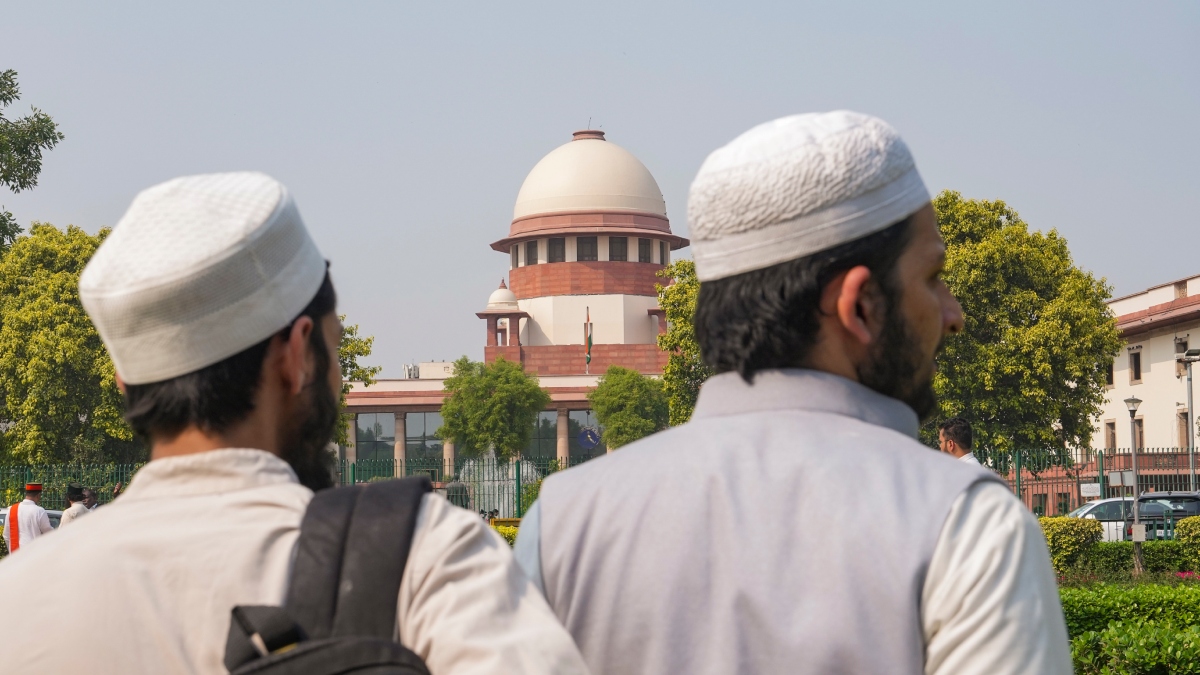Waqf amendment act: Supreme Court poses THESE questions to Centre
 The Supreme Court questioned the Centre about the decision having non-Muslims as majority members in Waqf Council | PTI
The Supreme Court questioned the Centre about the decision having non-Muslims as majority members in Waqf Council | PTI
The Supreme Court on Wednesday posed several questions to the Centre on the issue of non-Muslims on Waqf Council and Boards, pending enquiry by the collector on disputed waqf property and on abolishing of 'waqf by user'.
A three judges bench comprising Chief Justice of India Sanjiv Khanna, Justices Sanjay Kumar and K V Vishwanathan heard the case for nearly two hours and proposed an interim order.
The court asked the Centre about three concerns - the validity of Waqf by user properties declared earlier by court decrees which now may become void, having non-Muslims as majority members in Waqf Council, and pending enquiry by the collector on disputed Waqf property, the declaration that the same will not be treated as Waqf property.
Though the interim order wasn’t passed as Centre represented through Solicitor General of India Tushar Mehta sought some more time for his arguments. Accepting his request, the bench slated the hearing for Thursday – April 17 at 2 pm.
ALSO READ | Uddhav Thackeray’s party opposes Waqf bill for Muslim votes, says Sanjay Nirupam
During the hearing, the top court said, “Many of the Mosques were created in the 14th or 15th centuries. To require them to produce a registered deed is impossible. In most cases, say Jama Masjid of Delhi, the waqf will be waqf-by-user. There may be an abuse of “Waqf-by-user”, but there are genuine cases of “Waqf-by-user.”
Waqf-by-user is a legal doctrine that allows properties which have been used as Waqf properties for religious or charitable purposes, to be declared as Waqf.
"How can the Centre rewrite the past going back hundreds of years? If the Centre will denotify “Waqf-by-user” properties, it will create issues, CJI Khanna told Solicitor General of India.
On the issue of non-Muslims on Waqf Council and Boards, the court told Solicitor General Tushar Mehta that as far religious endowment of Hindus is concerned, no one else from other communities is a part of it.
ALSO READ | Three killed in Waqf protests in West Bengal; HC orders deployment of central forces
"Is the Centre prepared to say that it will allow Muslims to be a part of management committees of Hindu endowments?" the court asked.
SG Mehta said that he can state on affidavit that not more than 2 members will be non-Muslims.
At this, the top court further highlighted that only 8 out of the 22 members of the Waqf Council would be Muslims.
"So as per the Act, 8 members are Muslims. 2 judges may not be Muslims. Then the rest are non-Muslims," the bench said.
SG said, "Then this bench also cannot hear the case."
At this, CJI Khanna said, “When we sit over here. We lose our religion. For us both sides are the same. How can you compare it with the judges? Why not have non-Muslims also in the advisory board of Hindu endowments then.”
At the fag end of the hearing, the top court voiced concern on the report of violence in connection with the new law saying disturbing to see reports of violence.
ALSO READ | Sacred games: Legal battles, widespread opposition, criticism from political rivals threaten BJP’s move to amend Waqf Act
Agreeing with the bench, Solicitor-General Tushar Mehta said there was a phenomenon that you can pressurize the system.
The top court was hearing a batch of petitions challenging the constitutional validity of the Waqf (Amendment) Act, 2025.
As many as 72 petitions, including those by AIMIM leader Asaduddin Owaisi, All India Muslim Personal Law Board (AIMPLB), Jamiat Ulama-i-Hind, the Dravida Munnetra Kazhagam (DMK), Congress MPs Imran Pratapgarhi and Mohammad Jawed, have been filed challenging the validity of the Act.
India